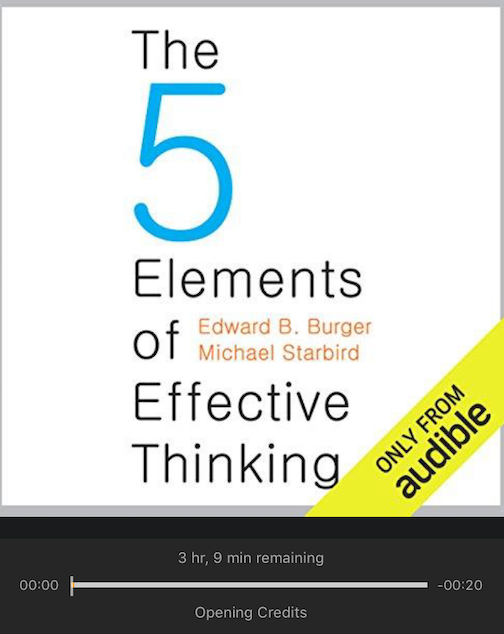The Five Elements of Effective Thinking by Edward Burger

Thinking is something that most cannot do well. Most people don’t truly know how to think through things, evaluate options, or make decisions as a result. People say things like, “As you age, your mind slows down.” Not me. I’m not going to say that. My subconscious does NOT have a filter. Whatever I say, my subconscious believes as truth. Whatever I think, my subconscious believes as truth. I am becoming better and better every day in every way.
The best sports teams focus on the fundamentals. The best athletes know what to do in every situation. They know what needs to get done and what needs to happen. Then, with the fundamentals already in place, they can EXPAND their knowledge and mastery. You could never best determine which club to use for a golf shot if you didn’t know what a golf ball looked like.
The depth by which you master the basics influences how well you understand everything after that.
There is always at least some level of success in all that we do. However, there is also always some level of failure. What will improve the possibility and confidence of success is constantly analyzing each and every attempt — regardless of failure and success. But then, determine what wasn’t as good as it possibly could have been. There is always something that could be improved. If you can’t find anything, ask someone else. As the author says, we might not know the right answer but we can definitely identify mistakes or errors.
Let errors be your guide — answer: this attempt is wrong because of ________. This shifts our mind to correcting mistakes rather than thinking of a correct solution because we don’t have one.
I do this now, I ask differently. If it were up to me, I would not close a group presentation by saying, “Do you have any questions?” but rather, “Which questions may I answer for you?”
Constantly generate questions and then ask them. Rather than asking if there are questions, assume that there are.
If people don’t know why they are doing something, why do it well? It doesn’t matter then, does it? If anyone can do a certain thing, why should you do it? Why not someone else? I think that these are two very very important questions to answer before starting a project or assignment.
Before starting a project or assignment ask:
What is the goal of the task?
What benefit flows from this task?
There are 5 elements that the author shared with us. The five habits are:
1. Understand deeply
2. Make mistakes
3. Raise questions
4. Follow the flow of ideas
5. Change
The first of the 5, understanding deeply.
Understand deeply.
It’s important to know the foundation and develop a level of mastery at the most basic levels before continuing and progressing forward. As the saying goes, “You do not truly understand something until you can explain it to a child.”
Earth — ground your thinking, understand deeply, clear the clutter, seek the essential, see what’s missing.
Make mistakes.
Work on the basics. Do you know the foundation and the big picture or are there holes?
Second, making mistakes is something that people do often. But, the way that our minds are wired, rejection is not something that we are always open to experiencing. There are biological blocks that present themselves. To succeed, we must fail.
“I’ve missed more than 9000 shots in my career. I’ve lost almost 300 games. 26 times, I’ve been trusted to take the game-winning shot and missed. I’ve failed over and over and over again in my life. And that is why I succeed.” — Michael Jordan
Fire — igniting insights through mistakes, fail to succeed.
Raise questions.

Third, raise questions, there are always questions. We always have questions or things that we want to be answered. Yet, why not ask them? If we withhold questions and do not develop answers before a task, we may not be using our time and energy efficiently. It is important that we are able to act in a way that keeps us focused and allows us to expand our horizons.
Air — create questions out of thin air, be your own Socrates.
Follow the flow of ideas.
Creating questions enlivens your curiosity. For each question that presents itself craft more focused questions that might lead to its solution. Question your questions. Ask questions before a task and keep them in mind as you continue a task.
The fourth point is following the flow of ideas. Ideas are in all of us and sometimes the best ideas come from things that have already been done. Amazon began as an online bookstore, bookstores had already existed for years and years. But, they focused initially on what could be improved and what could be done better than the past solutions had been already.

Water — seeing the flow of ideas, look back, look forward.
Change.
Create new ideas from old ones. Extend ideas, see if you can improve past solutions, find past solutions and see what could be better or what was not the best before.
Finally, engaging change, we must be open to adapting and growing and changing based on what others do and have done and will do.
Napoleon Hill’s book Think and Grow Rich talks about a mastermind group where we create meetings in our minds with figures that we do not personally know. People like Abraham Lincoln, Andrew Carnegie, or Henry Ford could all be part of that mastermind.
Engaging change, transforming yourself. Imagine in detail what someone more experienced would do differently than you. This means adopting the habit of improvement.

One of my favorite people, Shane Parrish, actually wrote about this book here a few years ago also. This book was excellent and while brief, quite insightful. It will definitely challenge the way I think and continue to help me expand my horizons and keep my mind open to possibilities that I haven’t thought of yet.
As my grandfather would say, “I have ideas I haven’t even thought of yet.”
I gave this book a 4.5/5